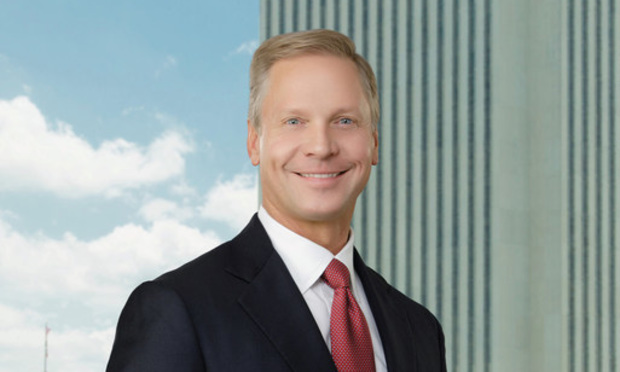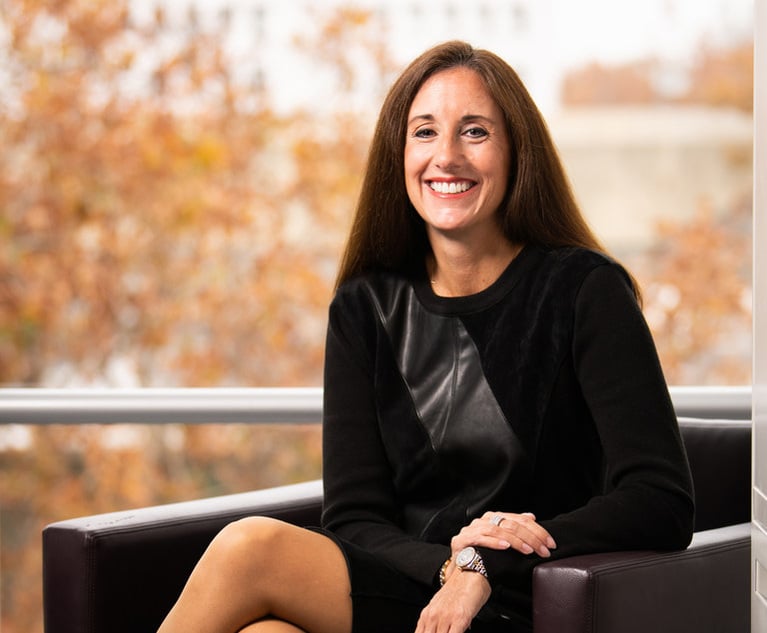Q&A: GrayRobinson's New President on the Firm's Future and Culture of 'Libertarian Professionalism'
Cannon, a lobbyist and former legislator, succeeded Mayanne Downs in September. He spoke with the Daily Business Review about the firm's individualistic culture and plans for its new Washington, D.C. office.
September 17, 2019 at 11:54 AM
5 minute read
 GrayRobinson President and CEO Dean Cannon
GrayRobinson President and CEO Dean Cannon
Dean Cannon, a GrayRobinson lobbyist and former speaker of the Florida House of Representatives, officially took the reins as president and CEO of the Am Law 200 firm in September. He succeeded Mayanne Downs, a forceful leader who trimmed the firm's head count and boosted the firm's profits and revenue per lawyer.
Cannon spoke with the Daily Business Review about lessons he learned as a lawmaker and how he plans to maintain the firm's culture of unilateral leadership and individualism. This interview has been edited for length and clarity.
Your background as a lobbyist is different from Mayanne's litigation background. Taking into consideration the firm's expansion into Washington, D.C. — its first outside of Florida— is GrayRobinson signaling a greater emphasis on lobbying?
My actual background as a lawyer for GrayRobinson began in litigation, land use and real estate development law in the late 1990s. Only later did I get into government service, then lobbying. First and foremost, we will always be a law firm, although we also always considered ourselves experts, not only providing legal services in the application of existing law, but also lobbying and government relation services where there's an argument to extend or change the law whether that's at the local, state, or now, the federal level.
So I think GrayRobinson has always helped clients succeed at the intersection of law and politics. Our D.C. offices completes the local, state and federal — the three levels of government — and reflects our continuing commitment to government relations and lobbying.
Mayanne's tenure was characterized by a contracting head count and greater profit margin. How will you build on or change this strategy?
She has positioned us well for a new season of growth. I'm looking at some targeted expansion into some Florida markets where we don't have a physical presence. We might also build out the D.C. office on the legal side as well as the government relations side. The D.C. office is a great platform to expand our healthcare and financial services practice areas.
So I'm looking at both geographic expansion, some added services at the federal level and then also building out some of our international practice groups. We have a pretty robust international practice and Florida is a hemispheric gateway, particularly to South America but also to the East and West.
How do your tenures as a legislator and House Speaker inform both your practice and leadership style?
I believe it's an asset because as Speaker of the House I had the privilege to deal with 119 legislators from all over the state. We have an incredibly diverse state: Miami is a different community than Lakeland, which is a different community from Tallahassee or Jacksonville or Gainesville. I learned that there's a great value in taking input from a multitude of different perspectives and synthesizing that into a common vision for how the organization will succeed. I'm hoping to bring that same approach to GrayRobinson.
One of the first things I did even before taking over as president was to send out a survey to the shareholders that asked about everything from our cultural values to some of our core operational elements and direction we want to go. It's important for a leader to listen and get input from everybody. Sometimes there's conflict, but my job as the president is to synthesize the collective input from our shareholders and clients.
Clients in 2019 and 2020 want more of an innovative approach in our practice. They want more efficiency in everything from billing to how you interface with them, and they really view lawyers more as business partners and allies than they did in the past.
GrayRobinson has a reputation for appointing strong, unilateral leaders. Will you lead in that same vein? And how will that affect your practice?
My primary emphasis is leading the law firm. Our strong president form of government allows us to be more agile in the marketplace, more responsive to client needs. One of the things that both our lawyers and clients like is that we have a very thin architecture of management and minimal bureaucracy. We can respond to a client or recruiting need quickly. We can redeploy resources very rapidly. We have what I think of as a sort of libertarian professionalism: We let lawyers practice to their maximum capabilities with a minimum of bureaucratic overhead.
That makes us an attractive place for lawyers from big firms where there's a lot of bureaucracy and hassle. At the same time it makes us attractive to lawyers from smaller firms because they get to maintain a high level of autonomy while having access to, literally, local, state and federal resources. It's been a great success for the last 49 years, and I intend to build on it.
This content has been archived. It is available through our partners, LexisNexis® and Bloomberg Law.
To view this content, please continue to their sites.
Not a Lexis Subscriber?
Subscribe Now
Not a Bloomberg Law Subscriber?
Subscribe Now
NOT FOR REPRINT
© 2025 ALM Global, LLC, All Rights Reserved. Request academic re-use from www.copyright.com. All other uses, submit a request to [email protected]. For more information visit Asset & Logo Licensing.
You Might Like
View All

EB-5 Rebounds After a Rocky Year: Challenges of 2024 Lay Groundwork for a Booming 2025

Are Counsel Ranks Getting 'Squeezed' as Nonequity and Associate Pay Grows?
5 minute readTrending Stories
Who Got The Work
J. Brugh Lower of Gibbons has entered an appearance for industrial equipment supplier Devco Corporation in a pending trademark infringement lawsuit. The suit, accusing the defendant of selling knock-off Graco products, was filed Dec. 18 in New Jersey District Court by Rivkin Radler on behalf of Graco Inc. and Graco Minnesota. The case, assigned to U.S. District Judge Zahid N. Quraishi, is 3:24-cv-11294, Graco Inc. et al v. Devco Corporation.
Who Got The Work
Rebecca Maller-Stein and Kent A. Yalowitz of Arnold & Porter Kaye Scholer have entered their appearances for Hanaco Venture Capital and its executives, Lior Prosor and David Frankel, in a pending securities lawsuit. The action, filed on Dec. 24 in New York Southern District Court by Zell, Aron & Co. on behalf of Goldeneye Advisors, accuses the defendants of negligently and fraudulently managing the plaintiff's $1 million investment. The case, assigned to U.S. District Judge Vernon S. Broderick, is 1:24-cv-09918, Goldeneye Advisors, LLC v. Hanaco Venture Capital, Ltd. et al.
Who Got The Work
Attorneys from A&O Shearman has stepped in as defense counsel for Toronto-Dominion Bank and other defendants in a pending securities class action. The suit, filed Dec. 11 in New York Southern District Court by Bleichmar Fonti & Auld, accuses the defendants of concealing the bank's 'pervasive' deficiencies in regards to its compliance with the Bank Secrecy Act and the quality of its anti-money laundering controls. The case, assigned to U.S. District Judge Arun Subramanian, is 1:24-cv-09445, Gonzalez v. The Toronto-Dominion Bank et al.
Who Got The Work
Crown Castle International, a Pennsylvania company providing shared communications infrastructure, has turned to Luke D. Wolf of Gordon Rees Scully Mansukhani to fend off a pending breach-of-contract lawsuit. The court action, filed Nov. 25 in Michigan Eastern District Court by Hooper Hathaway PC on behalf of The Town Residences LLC, accuses Crown Castle of failing to transfer approximately $30,000 in utility payments from T-Mobile in breach of a roof-top lease and assignment agreement. The case, assigned to U.S. District Judge Susan K. Declercq, is 2:24-cv-13131, The Town Residences LLC v. T-Mobile US, Inc. et al.
Who Got The Work
Wilfred P. Coronato and Daniel M. Schwartz of McCarter & English have stepped in as defense counsel to Electrolux Home Products Inc. in a pending product liability lawsuit. The court action, filed Nov. 26 in New York Eastern District Court by Poulos Lopiccolo PC and Nagel Rice LLP on behalf of David Stern, alleges that the defendant's refrigerators’ drawers and shelving repeatedly break and fall apart within months after purchase. The case, assigned to U.S. District Judge Joan M. Azrack, is 2:24-cv-08204, Stern v. Electrolux Home Products, Inc.
Featured Firms
Law Offices of Gary Martin Hays & Associates, P.C.
(470) 294-1674
Law Offices of Mark E. Salomone
(857) 444-6468
Smith & Hassler
(713) 739-1250







